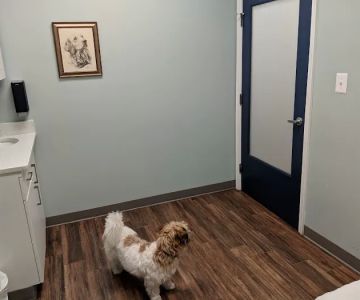How to Make My Pet More Comfortable at the Vet: Essential Tips for Pet Owners
- Why Pet Comfort at the Vet Matters
- Preparing Your Pet for the Vet Visit
- Creating a Calming Environment at the Vet
- What to Expect During the Vet Visit
- Managing Stress and Anxiety in Your Pet
- Finding the Right Veterinary Care for Your Pet
Why Pet Comfort at the Vet Matters
Visiting the vet can be a stressful experience for both pets and their owners. However, making sure your pet is comfortable during the visit is crucial for their well-being. A relaxed pet is more likely to have a positive experience, making it easier for the vet to provide necessary care. Reducing stress during vet visits can also improve your pet's overall health outcomes and make future visits less intimidating.
Preparing Your Pet for the Vet Visit
Preparation is key to ensuring your pet feels at ease during their visit. Here are a few tips:
1. Familiarize Your Pet with the Carrier or Leash
If your pet will be traveling in a carrier, make sure to get them used to it beforehand. Place treats or toys inside to create positive associations. For dogs, a leash walk before the visit can also help them feel more relaxed.
2. Maintain a Calm Demeanor
Pets are highly sensitive to their owners' emotions. If you're anxious about the visit, your pet may pick up on this and become stressed as well. Try to stay calm and composed, as your pet will look to you for guidance.
3. Stick to Your Pet’s Routine
Try to schedule the vet visit at a time that doesn’t interfere with your pet’s regular routine. This helps minimize disruptions and reduces the chances of your pet feeling disoriented or anxious.
Creating a Calming Environment at the Vet
The veterinary clinic can sometimes be a noisy and overwhelming place for pets. However, some simple steps can help make the environment more comfortable:
1. Choose a Pet-Friendly Vet
Not all veterinary clinics are created equal. Look for a clinic that is known for being pet-friendly and has a calm, welcoming environment. A vet who is experienced in handling anxious pets will be better equipped to ease your pet’s fears.
2. Wait Outside if Possible
If your pet is particularly nervous, consider waiting outside or in your car until it's their turn to be seen. Some clinics offer separate waiting areas for pets that are anxious or reactive, which can help reduce stress.
3. Bring Comfort Items
Bringing along your pet’s favorite blanket, toy, or even a familiar scent can help them feel more at ease. Familiar smells can have a soothing effect and provide comfort during the visit.
What to Expect During the Vet Visit
Understanding what happens during a vet visit can help both you and your pet feel more prepared. Here's a breakdown of what you might expect:
1. Initial Examination
The vet will typically begin with a general examination, checking your pet's weight, temperature, and overall health. This part of the visit may involve some handling, so having your pet familiar with being touched can make this less stressful.
2. Shots and Procedures
If vaccinations or procedures are needed, the vet will take care of them during the visit. While some pets may find this uncomfortable, quick treatments can help minimize distress. It's important to stay calm and reassure your pet during these moments.
3. Follow-Up Care and Advice
After the examination, the vet will provide you with advice on how to care for your pet. Whether it’s medication, dietary changes, or further treatments, understanding your pet’s needs will help you continue to make them comfortable at home.
Managing Stress and Anxiety in Your Pet
If your pet experiences stress or anxiety during vet visits, there are a few strategies that can help:
1. Behavioral Training
Start training your pet early to get them used to handling and being in different environments. Behavioral training can help them feel more at ease in unfamiliar situations, like vet visits.
2. Sedatives or Calming Supplements
If your pet’s anxiety is severe, consult your vet about using sedatives or calming supplements before the visit. This can help them stay relaxed during the appointment and reduce their stress levels.
3. Desensitization Techniques
Desensitization involves gradually getting your pet used to vet visits by making short trips to the clinic without any procedures. Over time, this can help them associate the vet visit with a neutral or positive experience.
Finding the Right Veterinary Care for Your Pet
Finding the right vet is essential for ensuring your pet’s comfort and well-being. Look for a clinic that specializes in pet care and has staff trained to handle anxious animals. Consider scheduling a meet-and-greet before your pet’s first visit to get a feel for the clinic’s environment and staff. If you're looking for professional, compassionate care, consider visiting Hidden Brook Veterinary, where experts prioritize your pet’s comfort.
For more information, or to schedule an appointment, visit Hidden Brook Veterinary.











